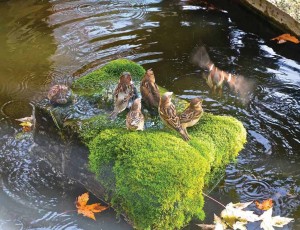Rebecca Aird
The disruptive effects of changing climate on the birds that nest in or migrate through our community may not be a top priority for residents of Old Ottawa East facing other climate realities. And yet, a vital realization is emerging from the climate crisis — the fate of humanity and the planet really are inseparable, and birds can provide an early warning of the challenges that may affect people.
According to the Audubon Society, two-thirds of North America’s bird species are at increased risk of extinction due to climate change. In combination with other human-caused threats, there has been a loss of about three billion birds since 1970. Some of the hardest hit are species of birds that are commonly found in Old Ottawa East (OOE).

Climate variability affects the insect population which, in turn, places many local bird species that rely on insects for their food supply at risk. Photo by Peter Fowler
Birds are memory-markers for many places I frequent in OOE, so I’ve chosen a few to profile.
In early May last year, I stopped to listen to a White-Throated Sparrowsinging its sweet, iconic “Oh sweet Canada Canada Canada” refrain along the Rideau River Nature Trail behind the Lees Avenue apartment buildings. Although an abundant species, the population of white-throats has already declined by about one-third since 1970. Audubon’s climate modelling projects that, by 2080, the White-Throated Sparrow could lose over 70 percent of its current summer range in the boreal forest. Predicted temperature rises and rainfall decreases in the boreal region will result in drier conditions that will affect the plants it depends on for nesting and the seeds and fruit that are its food.
As I’ve cycled to work past the junction of Echo Drive and Colonel By Drive, a Gray Catbird has loosed its rambling complex tunes from deep inside a sapling thicket. Because it breeds in shrubby places, human landscape disturbance can create favourable habitat, and this species seems to have increased in abundance in recent decades. Climate change may enable it to expand its range, at least in the eastern part of North America. However, its dependence on insect food makes it vulnerable to declines in insect populations (more on this below).
About 10 years ago, coming and going from my garden plot behind Saint Paul University, I would frequently see Chimney Swifts circling above the connecting corridor between the Laframboise building and Guigues Hall. Sadly, this species is experiencing a significant population decline throughout Canada and I seldom see them now. Loss of chimneys for nesting (which this species seems to like at least as well as the tree cavities where they traditionally nest) has been a major factor.
But as an aerial insectivore – birds whose diet consists of insects caught in flight — climate change is also a significant threat. Insectivores, in general, are vulnerable when insect populations are negatively affected by climate variability. For example, during early spring, long-distance travellers may arrive too late for the insect bonanza they need for successful nesting.
Among other pressures on birds that are exacerbated by climate change, higher temperatures challenge their ability to stay cool, and this can, in turn, disrupt feeding activity, reproduction and even survival. Most of the birds we see in Old Ottawa East migrate elsewhere for the winter and will have a greater likelihood of encountering severe weather during migration. Birds are demonstrating that climate change will affect the conditions where we live and the food we need to eat.
Let’s work on behalf of birds and people! Bird and climate-friendly actions include planting native trees and flowers in your garden, working with Sustainable Living Ottawa East(SLOE) to protect and restore our urban forest, and reduce your food waste so less land is needed to grow food. The delight we derive from birds – even at an unconscious level – is worth adding to the many other reasons to engage in climate action.
![]() Did you know that Old Ottawa East has a Bird-Friendly group? For more information contact birds@ottawaeast.ca. To get involved in SLOE’s climate change projects contact sloe@ottawaeast.ca
Did you know that Old Ottawa East has a Bird-Friendly group? For more information contact birds@ottawaeast.ca. To get involved in SLOE’s climate change projects contact sloe@ottawaeast.ca






